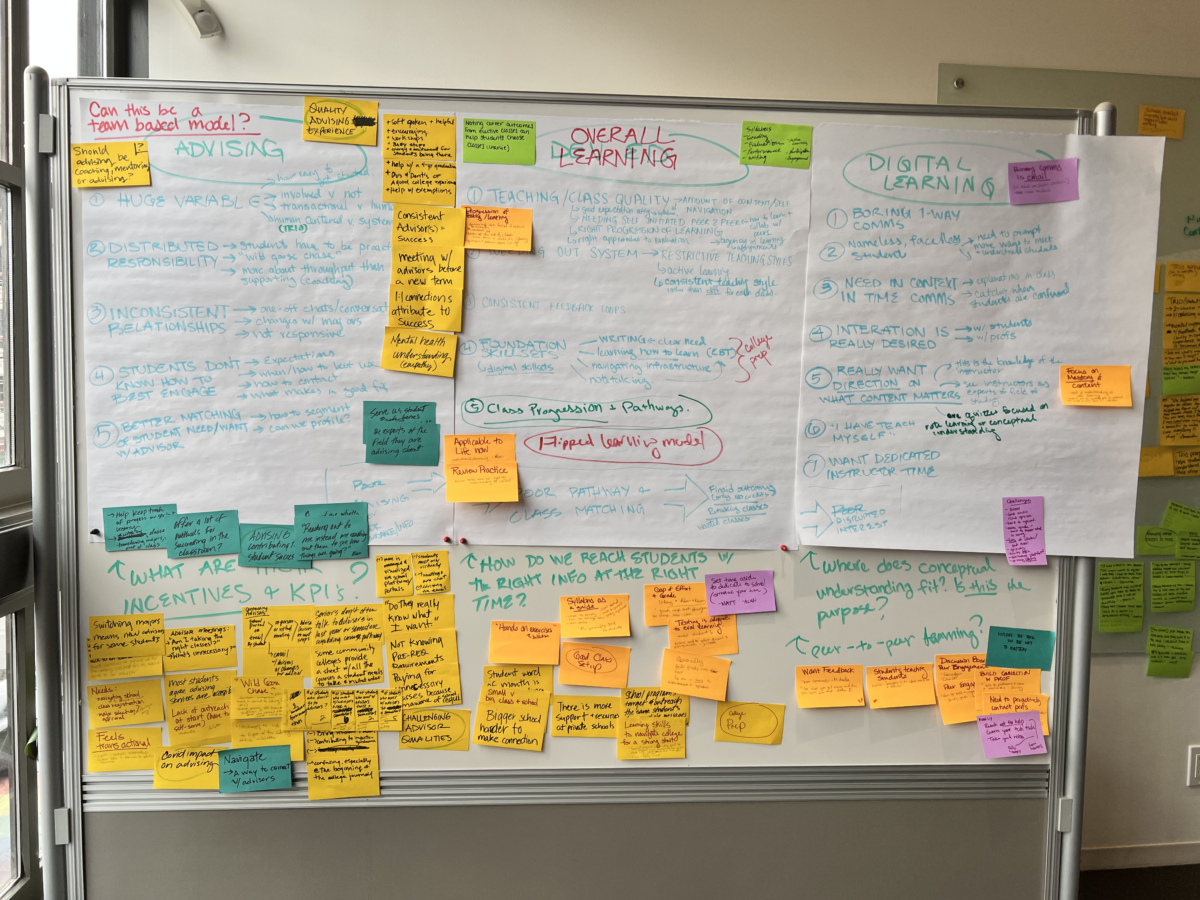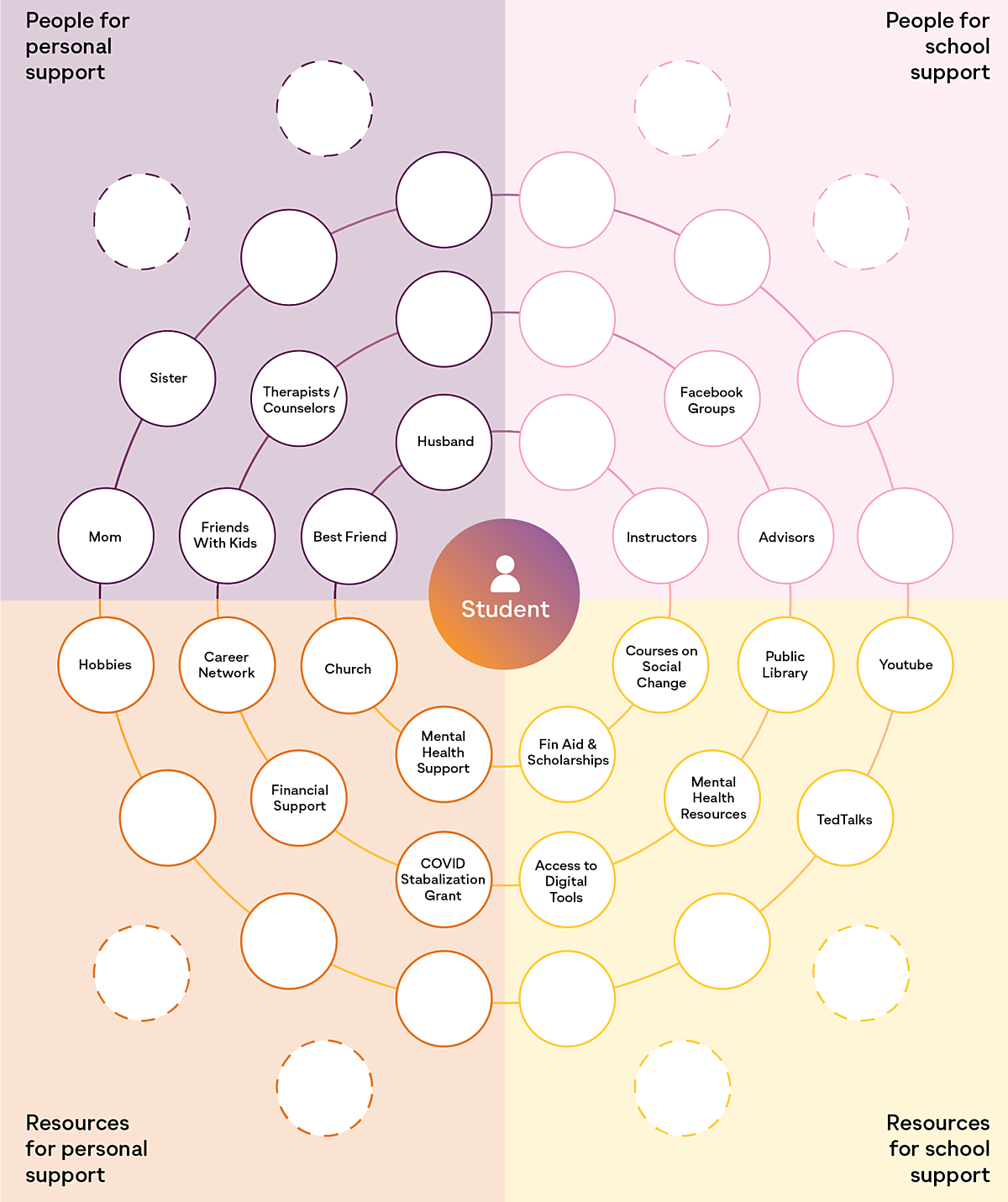Expertise
-
Equity-Centered Design Research
-
Synthesis + Sensemaking
-
Journey + Empathy Mapping
-
Co-design
-
Targeted Universalism
-
Equity Centered Design Capacity Building

Each student has unique lived experiences which shape their journey with postsecondary education. Optimistic Design’s Postsecondary Experience Toolkit was designed to elevate the voices and lived experiences of Black, Latinx, Indigenous students, and students experiencing poverty.
By co-designing the toolkit with students, we bring a new student-centered lens for creating more equitable and effective solutions. Built as a resource for institutions, advisors, policymakers, and courseware and other edtech developers, it helps bridge the gap between student realities and the innovations meant to support them.
Many postsecondary students—particularly Black, Latinx, Indigenous students, and students experiencing poverty—are frequently thrust into complex institutional systems that fail to adapt to their needs. Systemic factors, such as institutions not meeting student needs, financial burdens, or caregiving obligations, can create barriers that can lead to students feeling “pushed out” of courses, terms, or college altogether.
Centering student experiences in decision-making is a way for postsecondary administrators, advisors, and instructors to be more responsive to student needs. The customizable toolkit and accompanying ecosystem map provides these stakeholders with tools that are directly informed by student experiences, and co-designed with students. Institution leaders can use the toolkit to design more equitable systems that reduce barriers and improve student retention.
“It's not really about how smart the teacher is, but how [they are] able to touch a student's heart. Just being there in case [students] ever have any doubts or questions.Latinx Student, Pushed out, Public 2 yr Institution

Personas are profiles that organizations often use to ensure consideration of end users. However, they can be problematic for a number of reasons: they might be static and overly simplified, or, from an equity standpoint, they might be based on only a narrow demographic slice that might not represent users at the margins.
We set out to create a different type of persona: rather than a fixed profile, we wanted to create a toolkit that could be flexible, making it possible to actually design personas with students. In addition, we wanted to design the toolkit itself with students, centering their agency as participants, and using a strenghts-based approach to understanding their context and experiences.
Our research unfolded in three key phases, each designed to prioritize student voice, engage key stakeholders, and apply a systems-oriented lens to student challenges.
Centering Student Experiences in Research
Students are experts in their experiences, and their insights are essential to shaping meaningful institutional change that meet their needs. To center their voices, we created a research environment that shifted power between researchers and students to foster mutual learning.
For example, when we were iterating on the toolkit, we held workshops where students were able to directly edit and co-create the toolkit cards in Miro, and continued to follow up with them in further iterations.
We also conducted co-design workshops with subject matter experts and other stakeholders such as representatives from postsecondary institutions. This helped us finetune the toolkit for varied use cases, and to ensure it resonated with diverse stakeholders, within the postsecondary space.
Our work resulted in the creation of the Postsecondary Ecosystem Map and Personas Toolkit. This resource helps postsecondary administrators, educators, and product-focused stakeholders develop a shared understanding of postsecondary student experiences.


Bringing Student Journeys to Life with the Personas Toolkit
The personas toolkit, journey map, and ecosystem map illustrate the lived experiences of students. Unlike traditional personas that can reinforce demographic stereotypes, the toolkit provides opportunities to see different students' experiences across their postsecondary journey. These visual frameworks help teams across education, research, and technology understand how students navigate postsecondary systems—highlighting pain points, support structures, and opportunities for intervention.
23
Student lived experts
4
Advisors, instructors, and institutional staff


Let’s Design the Future of Learning, Together
We're using cookies to deliver you the best user experience. Learn More
It’s a form. You know what to do. But if not, send us an email at info@optimistic.design.